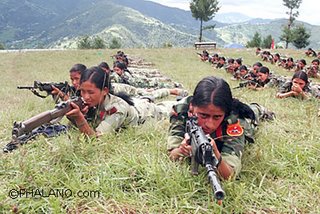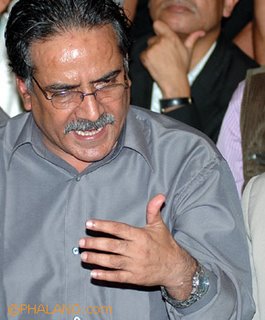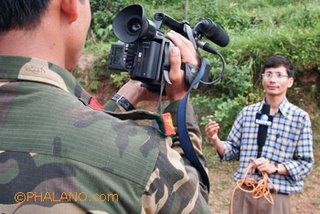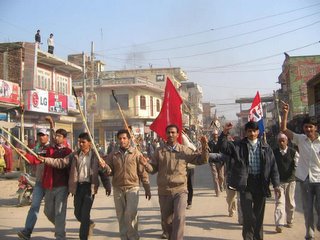fanatism in nepal

FANATICISM … THE VOLCANO WAITING TO ERUPT IN NEPAL
"It is the fate of our generation that our life requires that we be always prepared and armed, strong and determined, for it the sword be struck from our grasp we shall die."
Those are the words of Moshe Dayan - one of the world's greatest military leader, and foundation pillar of Israel. His intention was to carve out a sense of nationalization that could give the Israeli people a motive to live and fight for their life.
Recent developments in the region - South Asia, shows a new type of fight among the societies. The Region is struck last year by an earth quake but. What is awaiting is a volcano too dangerous to think of. Communalism and religious fanaticism seem to be taking deep roots in the culture of the subcontinent. It's Abrading the long established values of cohesion between different cultures. And to a surprise, no one has remained untouched by this development.
My reason for drawing your attention to the statement by Israeli Nation builder and then switching over to this completely different subject is one - to show how leaders (read politicians) of the times can exploit the feelings of the populace. There can be a positive optimization which leads to unity and cohesiveness among people but what is dangerous is the daubing of extremism. These matters - are and will be the centre of attention activities in the region for many years to come. The leftists group which believes that power flows from the barrel of the gun or the religious fanaticism ideology which has zero tolerance for a difference in belief. Belief, values and traditions have to change according to the time and the zeitgeist of a nation is always determined and influenced by the youth of the nation. Therefore the most troublesome outcome is that the youth in these affected area seems to be the most misguided groups of the populace.
The ideological dreams or the religious repentance whatever attracts the youth to violence - is not a problem singularly attached to a individual nation or a region but in today's world of global interdependence - it is the problem of the world.
Countries that helped the weed flourish are watching their own crops fall down. So, it is clear that whoever thinks he will benefit some way from extremism and fanaticism will fail.
India has a long history of violence among communities. This, as I said earlier has a tremendeous impact on the neighboring nations. The impact is direct in terms of a cultural similarity throughout the region as well indirect.
The Nepal Government declaring the Nation a secular state has recently aroused protest by some groups in the country. To think logically, neither the declaration nor the protest seems to be rational or based on some real analytical basis. The Government has declared this country a secular state for what is obvious - the feeling of over excitement has got over the government. After the recent display of power by people and the new found dictatorship the government enjoys in the restructuring of central policies - or reconstructing the shape of the country - with no opposition in the policy making establishments - an aura of despotism has got over the head of the Government.
Nepal doesn't need to be declared a secular state because being a 'Hindu State' on papers it was more secular in behavior. Will this declaration suddenly change the behavior pattern of the country? What about the new sense of protectivitism it has aroused among the Hindu majority? This will not only give more air to the sparks of difference among the religions beliefs but also start a previously non-existent debate for religions security among masses. The distinction between Hindu and Buddhist is very difficult in some communities - such is the secularism based on harmony.
Why then the Government was so over excited? Only an immature jitter among the leaders is probably the explanation of this.
This, can neither change the behavior pattern among the societies nor it has any significance in official terms -
Hence, the protest also seems to be equally illogical. The society was secular when the country was an only 'Hindu Nation' of the world. But what is annoying and perhaps dangerous in long terms is the paradigm shift in the society regarding religious matters. Violence spreads like fire when the3 whole region is caught in communal violence the Himalayan country cannot remain secluded from it for long. And the partisan politics played by the leader will not only disturb the social serenity of the nation regarding cultural matters - It will be another source of violence for the days to come.
Example of Kashmir should be an eye opener for the whole world. The Sufi tolerance culture based on communal harmony has been played over by various motives. Whatever be the interests of nations concerned to this - The region now is the epicenter of extremism - Religious fanaticism. The initial violence which started as freedom struggle has over the ages transformed it self into religions fanaticism. Now the Talibanization of the freedom struggle has a great and direct impart on the Kashmiri society.
Violence always and everywhere bears its mark on societies. Social harmony is eroded and communal balance is distributed. And more dreadful than that, it washes away the tolerance from the society. The youth emerging through an era of violence is always looted of optimism and opportunity. Live examples of darkened lives of orphans and widows not only weep in silence in front of us, the closed school buildings in the region have locked the doors to future.
Violence sets in the social psychology as a form of atavism, which sooner or later inflicts the Nation. Examples of dirty politics based on casteism must raise our tentacles today itself. After the successful people’s movement and the restoration of democracy in Nepal, what are the issues to ponder over for the intellectuals? Of course putting an end in the present struggle of the leftist is the first priority for the country. India is also concerned for the same because of the growing influence of the Maoist rebels in Chattisgarh and Jharkhand. The disarming Maoist in Nepal will in a same put the road map forward for Indian Maoist. And India cannot afford a neighboring country to blaze continuously in violence for long. The economy of a country like Nepal (similar to Kashmir) banks on tourism. Violence is the biggest enemy of tourism; this continued bankruptcy also has an impact on the Indian economic Boom.
This escalation may seem to be flowing downwards from the Himalayan kingdom but the reverse is actually true as far as any kind of fanaticism and extremism is concerned. The Indian soil has history of politics based on casteism, religions, community and class. In Nepal, even if the Maoist struggle comes to an end another struggle seems to have already started taking roots – the politics of religion and caste. Communal violence in Nepal is not heard of till now but mutual distrust and hate has grown over the years. The Maoist has in some way tried to cash on this politics as well but what is worse is waiting to come.
The politics in Nepal has been directly and indirectly influenced by India. History of founders of political movement in Nepal rests in India. The BP Koirala had not only participated in Indian struggle for freedom, but also honed its political skills and gained support from the Indians. Indirectly, changing norms of politics in India today have influence on the Nepali arena.
The Indian media is overwhelmingly present in Nepal and similar is the presence of the Indian polity. Over the years Indian suspicion over growing ISI activities has also increased over Nepal. So there seems to be a strong presence of both Indian and Pakistani agencies in Nepal.
But what is a concern of Nepal is its own long term security. The game plan of international agencies or forces in Nepal is continuously pushing the country into a communal threshold. The politics (of division) has crept in from the open borders - there cannot be any doubt on this. And developments if continued will one day lead to a breakage of the threshold level of communal or religious fanaticism. Nepali society is widely experiencing an increasing no. of Hindu extremists fueled by external sources. Such a development in long term will tantalize violence that will be disastrous for the already crippled economy of the country.
The region is a fertile land for extremism of all roots. India has a history of political communalism that is slowly breaching borders. Violence in one part of the sub continents explodes to a neighboring area is a natural way. Low literacy rate, lack of awareness among people and huge population as a devil's Workshop – what greater boon will fanaticism get anywhere? So the violent history of the region is self-explanatory. But what is not understandable is the habit reluctance to learn lesson from mistakes.
To fight violence off from the region is the only solution. But this is easy to say but hard realize in actual terms. The big players of the region have to understand its time to set aside these tit bits and run after higher goals. This has mainly two ways of operation.
Firstly, the already violent areas have to be dealt with a lot of patient and understanding. The problem may have social or political roots but an economic cause. Hence, these aspects have to be studied in detail and accordingly emphasis should be laid on each aspect. Neither seeking a political solution without an economic setup can work, nor can an economic brush off of the problem sustain long enough.
Secondly, we have to create isolated areas, this has further steps we can find out, in the first gaze only as to the areas that are still seemly away from extremism and fanaticism and then guarding them against the same. It is not only an immediate threat to the county's development it's also a long term strategic problem for the country. Which if not controlled, will lead to partition of the nation into many segments.
Enough has been lost in violence many lives of the people, many years the Nation. An important era of globalization of information technology has left the country untouched. The revolution is still on, what we need is to be a part of the ever increasing boom. First QR for development is a stable government. The growth if not curtailed will hamper the stability of the region as a whole.
In today’s world of interdependence – as the British Prime Minister Blair said – problem in Europe may have solution in Africa. Well, illustrating this is out of purview but what is implied is the foreign powers influential in Nepal must realize that any instability in Nepal will have a direct and deep impact on the adjoining areas. Hence, the feeding of extremism in an organized manner has to be stopped. But, although any such outside move will be welcome preventive actions have to be turn by people and politicians of Nepal.
The people of Nepal should not fall prey to partisan politics. What the country needs is a new sense of national unity based on mutual trust and faith. Without confidence, no nation can succeed. The world today has changed and no area of the world can remain untouched by the air of globalization. In this new age of economic globalization, to build the nation we need to have a new born faith in ourselves. The leadership has to guide the country into a new world without falling prey to the clutches of dirty politics.
The declaration of the Nation into a ‘secular state’ does not matter all that. But what is the Nepali culture of secularism where a Buddhists monastery has a Hindu temple within. The people of Nepal have to resolve today they will shield themselves against the classes of extremism and fanaticism and be prepared to arm the country economically, globally.






